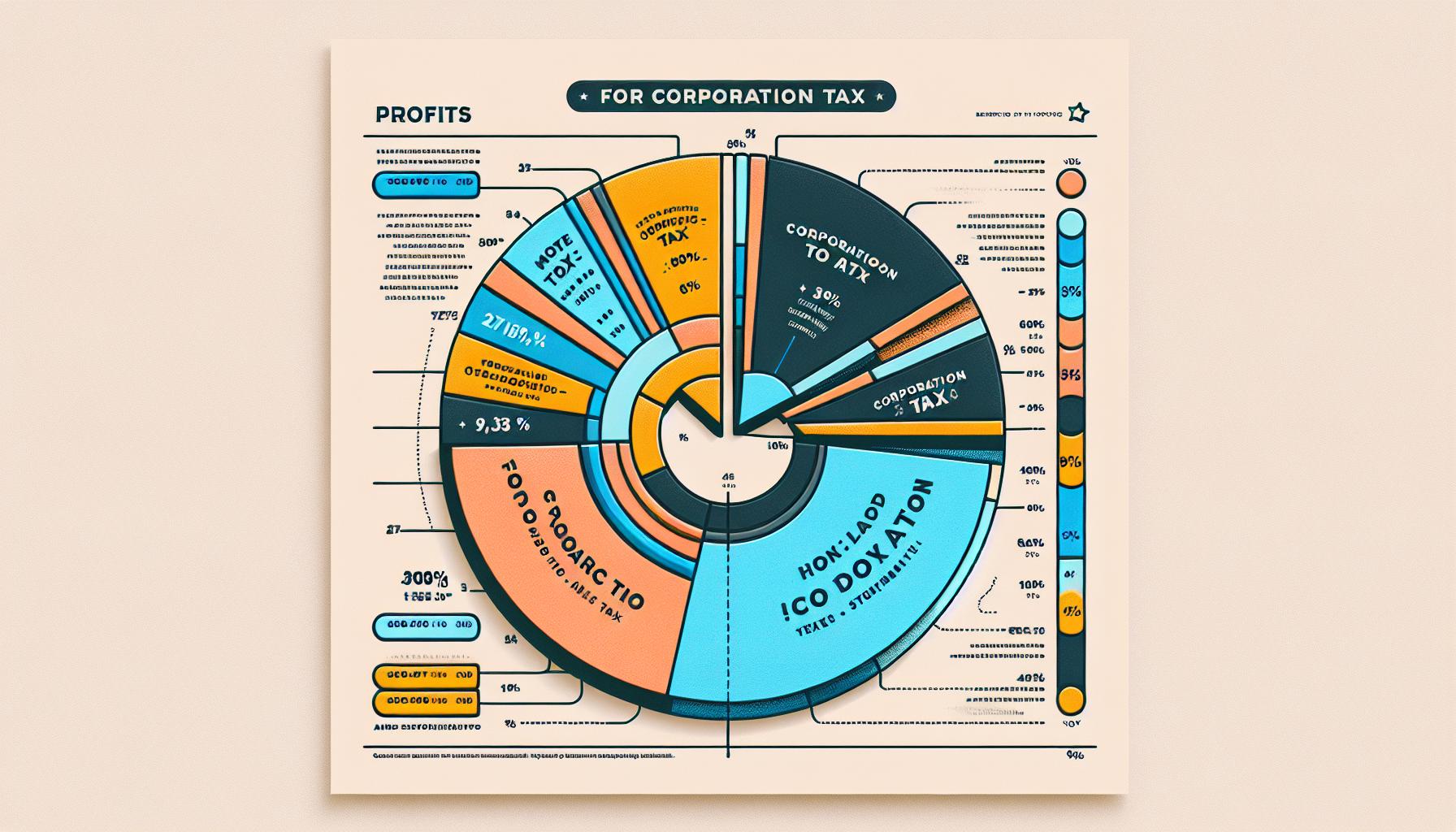January 20, 2024
Ltd Company Tax Guide: Know Your Payments & Savings
Exploring the tax world as a Ltd company can feel like trekking through a financial jungle. You're likely wondering how much of your hard-earned cash will be handed over to the taxman. It's crucial to get to grips with your tax obligations to keep your company thriving and compliant.
Understanding corporation tax, VAT, and other potential levies is more than just a legal necessity; it's a strategic must-do for savvy business owners like you. After all, who doesn't want to optimise their finances and stay ahead of the game? Let's jump into the nitty-gritty of taxes for Ltd companies and ensure you're not paying a penny more than you need to.
What is corporation tax?
When you're running a limited company, one of your key responsibilities is handling corporation tax. Think of it like a toll charge on the profit highway your business travels. The rate you'll pay depends on the taxable profits of your company.
Corporation tax isn't deducted automatically like income tax through PAYE; it's something you need to calculate and pay yourself. The current rate is 19%, but it's always worth checking for updates as this can change with new budgets.
Understanding Taxable Profits
Your company's taxable profits aren't just sales minus expenses. It includes:
Money made from trading
Investments
Selling assets for more than they cost (capital gains)
It's like trying to work out how much water is in a swimming pool without considering rainwater or evaporation. You need the full picture.
Common Misunderstandings
Don't fall into the trap of mixing up revenue with profit. Remember—revenue is the total income, while profit is what remains after expenses. It's easy to confuse the two, and it could lead you to miscalculate your tax.
Strategies to Manage Your Tax Bill
You might be thinking about how to keep your corporation tax in check. There are a few things you can do:
Claim allowable expenses to reduce your taxable profit
Make sure you're taking advantage of tax reliefs available to your business
Consider timing when you purchase assets to maximise tax benefits
These aren't tricks; they're just savvy business practices.
Incorporating Efficient Tax Practices
It's a good idea to seek advice from a professional accountant. They can help steer you through the maze of allowances and reliefs. If you're looking to keep a tight ship, setting aside a portion of your profits regularly for tax is prudent. You wouldn't want a tax bill catching you off guard.
Incorporating good tax practices means keeping accurate records. It's not just about being organised; it's the law. With precise records, you'll understand your company's financial health better, making it easier to plan for that 19% toll on your profits. Remember, while tax planning is important, it should never overshadow the primary goal of growing and making your business successful. Tax is just one piece of the complex puzzle that is running a limited company.
How is corporation tax calculated?

Understanding corporation tax begins with knowing your company's financial health. Think of your profit as if it were a pie. Corporation tax is a set slice of that pie the government takes. It's not based on every penny that comes into your business—that'd be your revenue—but on the profit your business makes. That profit is after you've paid off your costs, like a shopkeeper paying suppliers before calculating their takings for the day.
To start, you'll need your profit before tax from your financial statements. This is what you've earned before the taxman comes knocking. From this figure, subtract any allowable business expenses to whittle down your taxable profit. It's the smaller pie from which your tax slice is cut. Such expenses are things like office supplies or staff salaries—basically, anything that's necessary to keep your company ticking over.
Here's where some folks stumble. They mix up capital allowances and business expenses. Think of capital allowances as special tickets that allow you to pay less tax when you buy big, long-term assets, like machinery or computers. They’re your tax-saving helpers over several years, unlike regular business expenses, which are more like daily helpers.
Imagine corporation tax is a recipe, and you're the one baking this pie from scratch. You've got different ingredients, or tax reliefs and credits, that can change how much of this pie—the tax—you actually owe. If you're involved in innovating, like creating a new app or gadget, you might qualify for Research and Development (R&D) tax credits, effectively a discount on your tax pie.
Understanding VAT for Ltd companies

Imagine VAT, or Value Added Tax, as an extra layer on the cake that is the price of your goods or services. As a Ltd company, you'll sprinkle this layer onto your prices, collected on behalf of the government. But unlike a cake, you're not supposed to keep it. You hold onto it for a while, then pass it on to HM Revenue and Customs (HMRC).
But, there's a threshold to consider. If your turnover is above £85,000, VAT registration becomes mandatory; if below, it's optional. Let's bust a common myth right off the bat: registering for VAT doesn't always mean higher costs for your customers. If your clientele are other VAT-registered businesses, they'll claim the tax back. In a sense, you're a mere custodian of the VAT.
But if your end consumer can't reclaim VAT, prices could effectively rise for them. A frequent oversight includes forgetting to file VAT returns on time. Crikey, that's a mistake you don't want to make, as penalties can bite into your profits. Always keep your eye on the deadline; it’s typically a month and seven days after your VAT period ends.
There are a couple of ways to approach VAT that can tailor-fit your business needs. The Flat Rate Scheme could be your cup of tea if you prefer simpler calculations, allowing you to pay a fixed rate of VAT. But it's not for everyone; your annual turnover of VAT inclusive sales must be £150,000 or less to join.
Don't forget about the Cash Accounting Scheme. Cash flow can be a nag, right? This scheme lets you pay VAT on your sales when your customers pay you and reclaim VAT on purchases once you've paid the supplier — super handy if prompt payments aren't your customers' forte. A nifty practice to incorporate is meticulous record-keeping. You'll thank yourself when it's time to file returns or check if you can reclaim VAT on a business expense. A dedicated app or a software solution can make this challenging job a doddle.
Other taxes and levies to consider
When running a limited company, you'll quickly discover it's not just all about corporation tax and VAT. Think of your tax responsibilities as a world – each thread represents a different levy or tax, and together, they form the full picture of your company's tax obligations. Let's unravel some of these threads, shall we?
Employer’s National Insurance Contributions (NICs) are a crucial part of your tax narrative. Once you start hiring employees, you'll be responsible for paying NICs on their wages. It's like a membership fee for the social security system; the rates and thresholds vary, so check the latest figures to stay updated.
Don't forget about Business Rates, which are like council tax for your business premises. If you're working from an office or a shop, you'll likely need to pay this tax. But, there's some relief for small businesses, so it might be less daunting than you think.
Another element to consider is the Apprenticeship Levy. If your payroll exceeds £3 million annually, you're part of a system aiming to fund apprenticeship programs across the UK. It's a way of investing in the future workforce, with the levy set at 0.5% of your total pay bill.
Hear about the Dividend Tax? If you're taking money out of your company through dividends, there's a special tax for that. The rates vary depending on your tax band, and only earnings beyond your dividend allowance are taxable.
Here's a common misconception – many think professional services, like accountancy fees, are not tax-deductible. But that's not the case! These are considered allowable expenses and can reduce your corporation tax bill. Now, to navigate these taxes without hiccups, it's best to:
Use up-to-date accounting software, which can keep tabs on various taxes and remind you of deadlines.
Consider different tax schemes, like Employment Allowance, which can reduce your NICs up to a certain limit each tax year.
If you're in a creative industry, explore the Creative Industry Tax Reliefs. They're a suite of seven different tax reliefs that could significantly benefit your company.
Strategies to minimize your tax liability
Understanding how to reduce tax liability isn't just smart—it's essential for the financial health of your limited company. Here's a bit of friendly guidance on keeping more of your hard-earned money in your pocket.
Make Full Use of Allowances and Expenses
Just like packing an umbrella for a rainy day, claiming all allowable expenses is preparing for a fiscal downpour. You can claim a wide range of expenses, from office supplies to business travel. Let's say your office is your second home; if you're working from home, don't forget to claim a proportion of your utility bills.
Embrace Capital Allowances
If your company buys assets, like equipment or machinery, you can potentially deduct a part of their value from your profits before you pay tax—this is what's known as capital allowances. Think of it as a reward for investing in the tools that keep your business ticking.
Utilise Tax Relief Schemes
Tax relief schemes are like the secret ingredients in a recipe; they can significantly enhance the outcome. Schemes like Research and Development (R&D) tax credits support companies that work on innovative projects. If your business is a laboratory of fresh ideas, tax credits like these can be incredibly beneficial.
Incorporate Pension Contributions
Making pension contributions is not just planning for a comfortable retirement; it's a savvy tax move today. Contributions made by your company to an employee's pension scheme are usually tax-free, meaning they reduce the overall corporation tax bill. It's like planting a seed that grows into a sturdy oak tree of savings for tomorrow, while also fertilising your current financial soil.
Nevertheless, while these strategies can reduce your tax bill, there are common pitfalls. Misunderstanding what counts as an allowable expense or not keeping accurate records could trip you up. It's like baking without measuring your ingredients—things could go awry.
Regularly reviewing your tax position with a professional accountant can steer you clear of mistakes and uncover opportunities you might have missed. They'll ensure you're mixing the right financial ingredients to maximise your savings.
Remember, tax law can change frequently, so it's important to stay agile. Like the weather, just when you think you've got it figured out, it can shift. Keeping abreast of current legislation with a reliable accountant lets you adjust your umbrella accordingly, ensuring rain never spoils your parade.
Conclusion
Exploring the complexities of tax for your Ltd company can be challenging but with the right knowledge and strategies in place, you'll be better positioned to manage your tax liabilities effectively. Remember to leverage allowances and expenses, capital allowances, and tax relief schemes to your advantage. Don't forget the value of pension contributions as a tax-efficient tool. It's crucial to avoid the common pitfalls by engaging with a professional accountant who can help you stay on top of your tax responsibilities. Keeping agile and informed about the latest tax legislation will ensure that your company remains compliant while optimising its financial health. Stay proactive in your approach to taxes and you'll set your business up for enduring success.
Frequently Asked Questions
What strategies can help minimize tax liability for my limited company?
By understanding and utilizing allowances and expenses, investing in capital allowances, taking advantage of tax relief schemes, and making smart pension contributions, limited companies can effectively minimize their tax liabilities.
How important is it to use allowances and expenses to reduce tax?
It's very important. Utilizing all relevant allowances and expenses ensures you're not paying more tax than necessary. This can significantly reduce your company's overall tax burden.
Can capital allowances impact my company's tax?
Yes, capital allowances can have a significant impact by allowing your company to write off the cost of capital assets against taxable profit, thereby reducing tax liability.
Should I be aware of any tax relief schemes?
Absolutely. Tax relief schemes, like the Research and Development Tax Credits, can provide substantial savings. Being aware of and using these can further reduce your company's tax.
How do pension contributions affect my company's tax?
Making pension contributions is a tax-efficient way to extract profits from your company as they are typically deductible from your company's income, reducing the corporation tax bill.
Why is it necessary to avoid common tax pitfalls?
Avoiding common tax pitfalls is necessary to prevent unnecessary costs and potential penalties. It's important to be aware of these to ensure compliance and optimal tax planning.
How often should I review my tax position with a professional accountant?
It's advisable to regularly review your tax position with a professional accountant. They can provide insights into new legislation and help tailor your strategies accordingly.
Is staying up-to-date with tax legislation important?
Staying up-to-date with current tax legislation is crucial as it allows your company to adapt to changes and take advantage of new tax-saving opportunities. Being agile in your tax strategy prevents losses due to outdated practices.
Similar articles

January 20, 2024
Established fact that a reader will be distracted by the way readable content.

January 20, 2024
Established fact that a reader will be distracted by the way readable content.

January 20, 2024
Established fact that a reader will be distracted by the way readable content.

